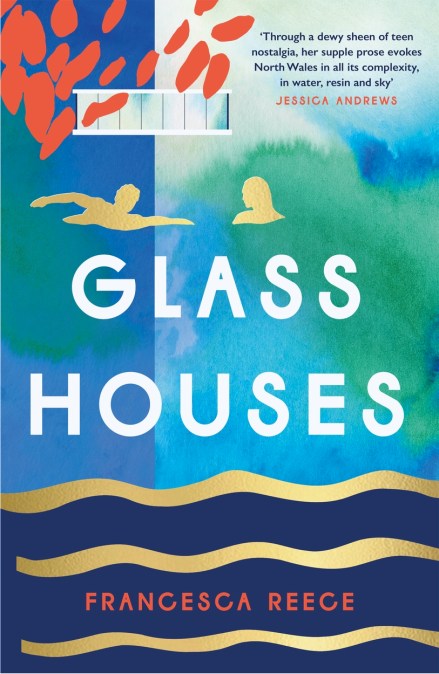‘Through a dewy sheen of teen nostalgia, Reece deftly explores the weight of political events on individual lives. Her supple, visceral prose evokes North Wales in all its complexity, beautifully rendered in water, resin and sky’
Jessica Andrews, author of Saltwater and Milk Teeth
‘Francesca Reece is a devastatingly compelling new voice in literary fiction’
Louise O’Neill, author of Asking For It and Idol
_______
Somewhere, in a box in Margot Yates’ attic there’s a video of Gethin by the lake at Ty Gwydr. He’s young – nineteen, maybe twenty. It’s late spring and dusk, and a low sun leaks white light into the horizon behind the dark fringe of trees. Olwen is filming. Gethin narrows his eyes at the camera. Her bodiless voice says to him, I love it here. He says, good. This place is ours.
Forester Gethin Thomas is struggling to make ends meet in his rural hometown in North Wales. Bright, charming, but unambitious, the thing that keeps him going is Ty Gwydr, a beautiful lakeside house that he keeps an eye on for absent English owners. The house has been empty for so long he’s come to think of it as his own.
That is until the owners decide to sell, sending Geth into freefall. And when he discovers that Olwen, his first love who left him and their small town for a new life in London, has returned to North Wales with her husband, Geth and Olwen will find themselves pulled back into the past and what could have been – or still could be.
But soon mysterious messages start arriving at the house, and they must question whether this is the love story they thought it was, or whether there might be something altogether more sinister lurking beneath the surface.
Jessica Andrews, author of Saltwater and Milk Teeth
‘Francesca Reece is a devastatingly compelling new voice in literary fiction’
Louise O’Neill, author of Asking For It and Idol
_______
Somewhere, in a box in Margot Yates’ attic there’s a video of Gethin by the lake at Ty Gwydr. He’s young – nineteen, maybe twenty. It’s late spring and dusk, and a low sun leaks white light into the horizon behind the dark fringe of trees. Olwen is filming. Gethin narrows his eyes at the camera. Her bodiless voice says to him, I love it here. He says, good. This place is ours.
Forester Gethin Thomas is struggling to make ends meet in his rural hometown in North Wales. Bright, charming, but unambitious, the thing that keeps him going is Ty Gwydr, a beautiful lakeside house that he keeps an eye on for absent English owners. The house has been empty for so long he’s come to think of it as his own.
That is until the owners decide to sell, sending Geth into freefall. And when he discovers that Olwen, his first love who left him and their small town for a new life in London, has returned to North Wales with her husband, Geth and Olwen will find themselves pulled back into the past and what could have been – or still could be.
But soon mysterious messages start arriving at the house, and they must question whether this is the love story they thought it was, or whether there might be something altogether more sinister lurking beneath the surface.
Newsletter Signup
By clicking ‘Sign Up,’ I acknowledge that I have read and agree to Hachette Book Group’s Privacy Policy and Terms of Use
Reviews
Glass Houses has the rare quality of handling heavy subjects with a real lightness of touch - how people shape places and how places shape people in turn, how the complexities of cultural identity are braided into the complexities of selfhood, how what we own will so often, in the final reckoning, come to own us
It was so refreshing to read about North Wales in this way and I've never seen the Welsh language presented so naturally within the prose and dialogue - this place, these characters, this community feel so real to me. I'm glad this novel exists and I can't wait for more people to discover this often overlooked history of our country. Gorgeously luscious and atmospheric, Gethin and Olwen are two characters that perfectly encapsulate the two halves of my heart and the gentle push and pull of North Wales
A magnificent, murderous grin of a novel: sharp-eyed and sharp-toothed in its modern appraisal of class and sexual tensions. Wittily, Reece shows us how hearts, houses and histories are claimed, and how many forms of capital are acquired by self-deception
Glass Houses is such a beautifully observed novel. A story of class and misunderstanding for and of our time, it flits between the eras, the churning emotions of its characters and the pretensions of today with sadness, compassion and humour. Through dazzling descriptive language, Francesca Reece draws us into the heart of Wales and the pain of relationships that cannot be resisted
A beautiful, compelling, intuitive voice
At once a love story and a simmering tale of class, identity, and masculinity
Desire, class and Welsh nationalism prove a combustible combination in this brooding literary romance... Flickers of menace are enhanced by atmospheric prose
Forester Gethin Thomas acts as caretaker for Ty Gwydr, a stunning lakeside house that has stood empty for so long he considers it his own. When the owners decide to sell up - which coincides with the return of the girl who broke his heart - the upheaval throws him off course. A beautiful novel about class, first love and how places can define us
Explores the impact of gentrification and second homes in north Wales
A cinematic page-turner
A razor-sharp commentary on social class, Welsh identity, and whether we have ownership over the places we come from. Through a dewy sheen of teen nostalgia, Reece deftly explores the weight of political events on individual lives. Her supple, visceral prose evokes North Wales in all its complexity, beautifully rendered in water, resin and sky

